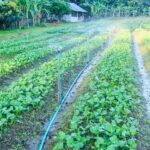What manure is best for vegetable gardening? When it comes to nurturing your vegetable garden, the type of manure you use can make a significant impact on the growth and health of your plants. Manure serves as a valuable source of nutrients and organic matter, essential for enriching the soil and promoting robust plant growth. This article will explore the various types of manure available for vegetable gardening and provide recommendations on the best options for specific vegetable crops.
Using manure in vegetable gardening is crucial for maintaining soil fertility and supporting healthy plant development. Whether it’s cow, horse, chicken, or composted manure, each type offers unique benefits in terms of nutrient content and soil improvement. Understanding the nutritional composition of different manures is key to maximizing their potential for enhancing the productivity of your vegetable garden.
In addition to discussing the different types of manure and their nutritional content, this article will also cover important safety guidelines for handling and applying manure to ensure the well-being of both plants and the environment. Furthermore, it will offer insights into composting manure and tips on sourcing high-quality manure for optimal results in vegetable gardening. Stay tuned to discover how to make the most out of using manure in your vegetable garden.
Understanding the Different Types of Manure
When it comes to vegetable gardening, choosing the right type of manure is crucial for the health and productivity of your crops. There are several options available, each with its own unique benefits and considerations. Understanding the different types of manure will help you make an informed decision about which one is best for your garden.
Cow Manure
Cow manure is a popular choice for vegetable gardening due to its balanced nutrient content. It is rich in nitrogen, phosphorus, and potassium, making it suitable for promoting healthy plant growth. However, fresh cow manure can be high in salts and can burn delicate plants if not properly aged or composted.
Horse Manure
Horse manure is another common option for vegetable gardens. It tends to have a lower nutrient content compared to cow manure but still provides valuable organic matter to improve soil structure. Since horses don’t digest weed seeds as well as cows, be mindful of potential weed seeds that may be present in horse manure.
Chicken Manure
Chicken manure is prized for its high nitrogen content, making it an excellent choice for leafy green vegetables that require plenty of nitrogen for lush growth. However, chicken manure is also known for being “hot,” meaning it can easily burn plants if applied too heavily or without proper composting.
Composted Manure
In addition to animal-based manures, composted manure from various sources such as livestock farms or compost facilities can provide a well-balanced mix of nutrients while reducing the risk of burning plants. Composted manure also helps improve soil structure and water retention capabilities, making it a versatile choice for vegetable gardening.
Understanding the differences between these types of manure will allow you to select the best option based on your specific gardening needs and plant preferences. Consider factors such as nutrient content, potential risks (such as burning), and availability when deciding which type of manure to incorporate into your vegetable garden.
Nutritional Content of Manure
Manure is a valuable source of nutrients for vegetable plants, providing essential elements that contribute to healthy growth and abundant harvests. Different types of manure contain varying levels of key nutrients, making them suitable for different vegetables and soil conditions. Understanding the nutritional content of manure is crucial for selecting the best type to support the specific needs of your vegetable garden.
Cow manure, for example, is known for its balanced nutrient composition, containing moderate levels of nitrogen, phosphorus, and potassium (N-P-K). This makes it a suitable choice for most vegetable crops, especially those with high nutrient demands such as tomatoes and peppers.
On the other hand, chicken manure is higher in nitrogen but can be too strong if used fresh due to its high ammonia content. Composted horse manure is a popular choice as it provides a good balance of nutrients and beneficial microorganisms while being less prone to burning plants.
When deciding what manure is best for vegetable gardening, it’s important to consider not only the nutrient composition but also how it can affect soil structure and pH. For instance, rabbit manure has lower nitrogen content compared to other livestock manures but excels in its ability to improve soil texture and water retention. Additionally, using composted manure instead of fresh manure reduces the risk of harmful pathogens and weed seeds being introduced into your garden.
In order to determine which type of manure is best suited for your vegetable garden and specific crops, conducting a soil test can provide valuable insights into existing nutrient levels and deficiencies. This information will help guide you in selecting the most appropriate type of manure or combination of manures to meet the specific needs of your garden.
| Manure Type | Nutrient Content | Suitability |
|---|---|---|
| Cow Manure | Moderate levels of N-P-K | Suitable for most vegetable crops |
| Chicken Manure | High in nitrogen; caution required when using fresh due to ammonia content | Ideal for leafy greens but should be aged or composted before use |
| Horse Manure (composted) | Good balance of nutrients and beneficial microorganisms; less likely to burn plants | Suitable for a wide variety of vegetables without risk of over-fertilization |
Using Manure Safely
Using manure in vegetable gardening can provide numerous benefits for the soil and plants. However, it is essential to handle and apply manure properly to ensure the safety of the plants and the environment. Here are some important methods to consider when using manure in your vegetable garden:
- Composting: Composting manure is a crucial step in ensuring its safe application. This process helps break down potential pathogens and reduces the risk of contamination. When composted properly, manure becomes a valuable soil amendment that provides nutrients to vegetable plants without posing a health hazard.
- Application Timing: It is important to apply manure at the right time to minimize the risk of contamination and ensure its effectiveness as a fertilizer. Avoid applying fresh manure close to harvest time, as this can increase the likelihood of contamination on edible parts of the vegetables.
- Proper Handling: When handling manure, especially fresh animal manure, it is essential to take precautions such as wearing gloves and washing hands thoroughly afterward. This can help prevent potential exposure to harmful bacteria and pathogens present in raw manure.
By following these methods for using manure safely in vegetable gardening, you can minimize potential risks while maximizing its benefits for your plants and soil.
Whether you opt for cow, horse, chicken, or composted manure, it’s crucial to prioritize safety when utilizing these natural fertilizers in your vegetable garden. By understanding how different types of manure affect plant growth and soil fertility, you can make informed decisions about which type best suits your gardening needs.
Additionally, knowing where to source high-quality manure from local farms, garden centers or compost facilities can further ensure that you are using safe and beneficial fertilizers in your vegetable garden.
Ultimately, proper handling and application of manure play a significant role in maintaining a healthy and productive vegetable garden while minimizing potential health risks associated with the use of organic fertilizers. Remembering these essential guidelines will help you harness the full potential of using manure safely in your vegetable gardening endeavors.
Best Manure for Specific Vegetable Crops
Tomatoes, peppers, and leafy greens are popular choices for vegetable gardening, and each of these crops has specific nutrient needs that can be supported by the right type of manure. When considering what manure is best for vegetable gardening, it is important to take into account the nutritional requirements of these plants to promote healthy growth and abundant harvests.
For tomato plants, poultry manure is often recommended due to its high nitrogen content. Nitrogen is crucial for promoting lush foliage and overall plant growth, which can lead to more robust tomato production. Additionally, composted cow manure is beneficial for tomatoes as it provides a slow release of nutrients throughout the growing season, supporting strong root development and fruit formation.
Peppers also benefit from a balanced supply of nutrients but have a higher need for phosphorus to encourage flowering and fruiting. Composted horse manure contains higher levels of phosphorus compared to other types of manure, making it an excellent choice for pepper plants. It also contains potassium, which aids in overall plant health and disease resistance.
Leafy greens such as lettuce, spinach, and kale thrive when provided with well-rotted chicken manure. This type of manure offers a range of essential nutrients such as nitrogen, phosphorus, potassium, and trace minerals that support vigorous leafy growth while ensuring the development of tender leaves with excellent flavor.
When choosing the best manure for specific vegetable crops, it is vital to consider the nutrient composition and characteristics that will best suit the needs of each plant. By understanding how different types of manure can support your vegetables’ growth and development, you can make informed decisions on which option will be most beneficial for your garden’s success.
| Vegtable Crop | Recommended Manure Type |
|---|---|
| Tomatoes | Poultry or Composted Cow Manure |
| Peppers | Composted Horse Manure |
| Leafy Greens (lettuce, spinach, kale) | Well-rotted Chicken Manure |
Composting Manure
Composting manure is a beneficial process that can transform raw animal waste into a nutrient-rich soil amendment suitable for vegetable gardening. This method not only helps to reduce the presence of harmful bacteria and pathogens in manure but also aids in breaking down the organic matter, making essential nutrients more readily available to plants. Here’s how you can effectively compost manure for your vegetable garden:
- Collecting: Start by collecting fresh manure from herbivorous animals such as cows, horses, or goats. Avoid using manure from carnivorous animals like cats and dogs due to potential pathogens and parasites.
- Layering: Layer the collected manure with other organic materials such as straw, leaves, or kitchen scraps. This mixture will help create a balanced carbon-to-nitrogen ratio for effective decomposition.
- Aeration: Regularly turn the compost pile to provide adequate aeration and promote microbial activity. This helps accelerate the breakdown process and prevents foul odors from developing.
Composting manure not only reduces odor and eliminates potential pathogens but also creates a valuable soil amendment that enhances the texture and fertility of garden soil while improving its water retention capacity. Once properly composted, the resulting material can be applied to vegetable gardens to promote healthy plant growth, higher yields, and improved overall soil health.
Remember that proper management of the composting process is crucial to produce high-quality finished compost that poses minimal risk to plants and the environment. By following these steps and best practices for composting manure, you can create an excellent soil amendment that will benefit your vegetable garden.
Where to Source Quality Manure
When it comes to sourcing quality manure for vegetable gardening, there are several options available to consider. The quality of the manure plays a significant role in the overall success of a vegetable garden, so it’s important to choose the right source. Whether you’re looking for fresh manure or composted manure, there are a few key places where you can obtain high-quality manure for your gardening needs.
Local Farms
One of the best places to source quality manure for vegetable gardening is from local farms. Many farms produce their own organic manure from livestock such as cows, horses, and chickens. Farmers often have excess manure that they are willing to sell or give away to individuals looking to enrich their gardens. This option not only provides access to fresh manure but also supports local agriculture and sustainability efforts.
Garden Centers
Garden centers and nurseries are another reliable source of quality manure for vegetable gardening. These establishments often carry a variety of organic fertilizers and soil amendments, including bagged or bulk manure. Garden centers typically offer valuable advice on the different types of manure available and how to use them effectively in vegetable gardens. They may also provide recommendations based on specific crop needs and soil conditions.
Compost Facilities
For those looking for composted manure as a soil amendment, compost facilities are an excellent place to obtain high-quality organic matter for vegetable gardening. Composted manure undergoes a natural decomposition process, resulting in a nutrient-rich product that is safe and beneficial for plants. Many municipalities have compost facilities that offer composted manure for sale or as part of their composting programs.
By exploring these different sources, gardeners can find quality manure that suits their specific needs and contributes to the health and productivity of their vegetable crops.
Tips for Maximizing Manure Benefits
In conclusion, understanding the importance of using manure in vegetable gardening and selecting the best type for specific crops can significantly enhance the health and productivity of your garden. By exploring the different types of manure available, such as cow, horse, chicken, and composted manure, gardeners can make informed decisions about which option will best suit their individual needs.
Additionally, being aware of the nutritional content of manure and how it benefits vegetable plants provides valuable insight into the impact that this natural fertilizer can have on overall plant growth and development.
Furthermore, it is crucial to handle and apply manure safely to ensure both plant and environmental safety. Proper techniques for composting manure can also create a nutrient-rich soil amendment that will further benefit vegetable gardening endeavors.
Finding high-quality manure from reputable sources like local farms, garden centers, or compost facilities is essential for achieving optimal results. Finally, by implementing additional strategies for maximizing the benefits of using manure in vegetable gardening-such as proper application timing and frequency-gardeners can improve their chances of a successful harvest.
With the knowledge gained from understanding the intricacies of utilizing manure in vegetable gardening-from identifying the best type for specific crops to handling and applying it safely-gardeners can leverage these insights to create thriving vegetable gardens that yield bountiful harvests. By following these guidelines and tips for maximizing manure benefits, both novice and experienced gardeners alike can greatly enhance the health and productivity of their gardens.
Frequently Asked Questions
What Is the Best Manure to Add to a Vegetable Garden?
The best manure to add to a vegetable garden is well-aged and composted manure, such as horse or cow manure. This type of manure has broken down sufficiently and won’t burn your plants with excess nitrogen.
Is Cow Manure or Chicken Manure Better for Vegetable Gardens?
Both cow and chicken manure can be beneficial for vegetable gardens, but they have different nutrient compositions. Cow manure tends to be lower in nitrogen but higher in organic matter, making it great for improving soil texture. On the other hand, chicken manure is higher in nitrogen but should be composted first to avoid burning the plants.
Which Vegetables Don T Like Manure?
Some vegetables don’t like fresh manure, especially those from the nightshade family like tomatoes, peppers, and eggplants. These plants are sensitive to high levels of nitrogen and can end up with excessive foliage growth at the expense of fruit production when exposed to fresh manure. It’s best to use composted manure for these vegetables instead.

If you’re looking to get into vegetable gardening, or are just looking for some tips on how to make your current garden better, then you’ve come to the right place! My name is Ethel and I have been gardening for years. In this blog, I’m going to share with you some of my best tips on how to create a successful vegetable garden.





